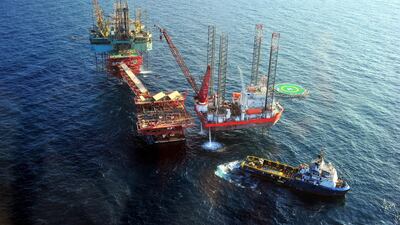Just as the map to Luke Skywalker drove the cast of Star Wars: The Force Awakens on through the story and on to the steps of Skellig Michael, so the price of a barrel of Brent drove the governments of the Gulf Cooperation Council (GCC) states onward through 2015.
The US rapper Kendrick Lamar’s plaudit-winning album of the year, To Pimp a Butterfly, may not have featured a track called How much a barrel cost, but if it had, it would have captured the zeitgeist of the Arabian Gulf just as neatly as it did the mood of Ferguson, Missouri.
No one has yet called it Black Tuesday, but on Tuesday December 22, oil fell to an 11-year low of US$35.98, signalling an end to a decade of plenty for Opec member states, during which Brent crude rose to $110 per barrel in July last year.
The IMF estimated that the low oil price would cost Middle East oil exporters more than $300 billion in lost earnings: about a fifth of their collective GDP. This would be a huge, shock to their economies – if it was paid out in lost economic growth. As it is, Gulf states have been deploying their reserves, squirrelled away in the decade of expensive oil from 2003 to 2013, to soak up the costs.
Growth slowed across the Gulf but, with the exception of Kuwait, has not stopped. The Gulf states have continued to spend fast enough to keep their economies growing. Corporate profitability is closely tied to government spending in the Gulf, the IMF says. With the exception of Dubai, the state is the prime motor of economic activity. Even the private sector depends on government contracts.
How long Gulf states can keep this up depends on how long their reserves – and the low oil price – lasts.
The UAE and Qatar are best-placed, by dint of having the largest reserves relative to the size of their economies, and the smallest deficits. Abu Dhabi, the world’s sovereign wealth fund capital, has enough assets to maintain big deficits for between 25 and 100 years, depending on whether you ask the IMF or Deutsche Bank.
The tricky bit to grasp is this – all the economic pain is self-inflicted.
Saudi Arabia thinks that by keeping the oil price low, it will crush new, low-cost firms that threaten vastly to expand North American output and dethrone the kingdom as the world’s largest oil exporter.
What analysts have not decided is whether this strategy is foolhardy or ingenious.
Saudi Arabia will run a budget deficit of 21 per cent this year, according to the IMF. The country has financial reserves of about 100 per cent of GDP, meaning that at its current rate of spending, the kingdom will deplete its store of spare cash in five years.
McKinsey warns that, with 6 million new jobs needed in the next five years, Saudi Arabia must create employment at a rate not seen before in the history of the kingdom.
Prince Mohammad bin Salman Al Saud, the kingdom’s deputy crown prince, promised during a closed-door meeting of investors this month a raft of measures that could please The Firm: privatisations; public spending cuts; new budgeting procedures. But with Saudi Arabia’s private sector still underdeveloped and generous welfare policies still integral to the population, it remains to be seen how extensive these reforms would be.
Unknown, too, is the future price of oil. Will Saudi Arabia relent and encourage Opec to enforce stricter quotas, pushing up the price? Or will new Iranian demand, plus rising shale output, lead to further declines in Brent?
The Fed pulls the trigger
The Federal Reserve’s much-mooted interest rate rise finally took place this month. The Fed Funds rate now stands at 0.25-0.5 per cent. The decision was a case study in anticlimax, having been trailed many months in advance. Janet Yellen, the Fed’s chairwoman, will be pleased with this. There was no repeat this month of the taper tantrum that upset emerging markets last year. Borrowing costs are set to rise marginally. So far, all is calm.
Nonetheless, the end of zero interest rates could be bad news for emerging markets. The IMF warned this year that corporate bankruptcies could shoot up when higher borrowing costs are transmitted to the real economy.
When the tide of cheap cash goes out, bad accounting practices make themselves known.
Le Prix Nobel
Angus Deaton, the Princeton economist, won this year’s Nobel Prize for contributions to economics’ understanding of consumption, welfare and poverty. Consumption theory had previously spent a great deal of time inferring household budgets from aggregate income data. Mr Deaton showed that starting with the household as the unit of analysis was significantly more insightful.
A recent paper, co-authored with Anne Case, showed that life expectancy among American working-class white men was declining – in direct contrast to the trend seen up until now, with economic development leading almost exclusively to life expectancy improvements. No longer does economic growth mean longer lives, the lesson seemed to be.
Mr Deaton’s use of survey data – he is on the record as early as 1992 demanding that big data drive a revolution in macroeconomics – was just as pioneering as his theoretical contributions. Measurement matters.
abouyamourn@thenational.ae

